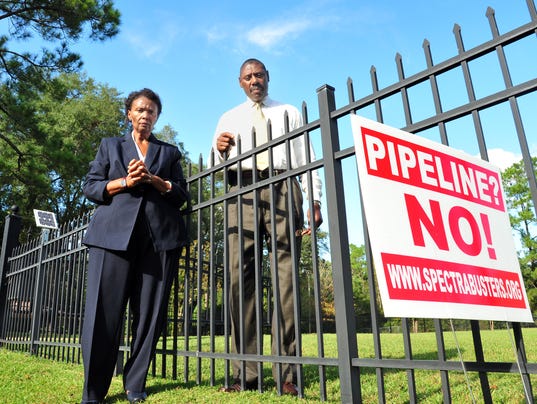ATLANTA (AP) — A proposal to build a $3.7 billion pipeline system carrying natural gas into Florida is raising complaints from Georgia residents — including media mogul Ted Turner — who say they’d face environmental costs while others get the benefits.
Spectra Energy Partners and NextEra Energy are seeking federal permission to build the Sabal Trail and the Florida Southeast Connection, about 600 miles of pipeline bringing natural gas from a hub in Alabama, across southwest Georgia and to power plants in Florida. If approved by the Federal Energy Regulatory Commission, the system would start operating in mid-2017.
The project is an economic and political balancing act. The United States has benefited from its expanding supply of natural gas, which has pushed fuel prices to historic lows and made it possible for utility companies to close coal plants for cleaner, gas-burning power plants. The growing reliance on gas also means customers need a steady supply of the fuel. Developers say the two existing pipes serving peninsular Florida are running at nearly full capacity.
“What people certainly worry about is when I wake up in the morning and I hit the switch on the wall are the lights going to come on?” said David Shammo, Spectra Energy’s vice president of business development in the southeast. “It’s really about reliability of service.”
Project opponents say the pipeline will decrease property values, cause pollution and put their communities at risk of accidents while the big benefits go to the Florida market.
“We’re just the pass-through,” said Gloria Gaines, who faults developers for proposing a compressor station in her predominantly black community south of Albany. “When you look at it at the micro level, there is no value.”
If federal regulators approve, developers would have the right to force landowners to let the gas pipeline pass under their property. While landowners would be paid, they couldn’t build anything on top of the pipe.
Energy firms say the project is necessary to meet Florida’s appetite for gas. Florida Power & Light Co., a subsidiary of NextEra, wants additional gas supplies to serve its fleet of gas-fired plants. Meanwhile, Duke Energy has plans to build a new combined-cycle gas plant in Florida’s Citrus County.
A new pipeline would make Florida less dependent on gas from the Gulf of Mexico region, allowing it to draw more heavily from production basins in Texas, Arkansas, Oklahoma, Louisiana and markets in the Northeast, developers say. That means Florida would be less likely to run short of gas if a hurricane damaged Gulf production facilities.
The U.S. Environmental Protection Agency has recommended FERC ask for more proof to verify the existing pipelines were at their limits, according to case filings. The EPA also questioned whether Florida already had access to diverse sources of natural gas and noted electricity sales had been dropping since 2007.
NextEra, Spectra or their related political committees have donated several thousand dollars to politicians, including Alabama Gov. Robert Bentley and Georgia Gov. Nathan Deal.
The plan faces some corporate opposition. A compressor station forcing gas through the pipe near Albany would sit about a quarter mile from Ted Turner’s Nonami Plantation, where he’s hunted quail for decades. Turner’s company has asked that Georgia authorities withhold a necessary permit because the facility would emit air pollutants and disturb people and wildlife. As an alternative, it asked that the station use a cleaner, quieter electric compressor powered by solar energy.
“It is our hope that Sabal Trail Transmission will take the community’s concerns seriously and consider alternative routes that are far safer and more direct, and possibly avoid the state entirely,” Turner Enterprises spokesman Phillip Evans said.
Former U.S. Sen. Bob Graham told federal regulators in a September letter that his family’s Angus beef farm in Georgia “in no way” supports the proposed route across its 8,000-acre property outside Albany.
“Their routing comes through our farm up there and we’d rather it would go elsewhere,” said Stuart Wyllie, CEO of Graham Cos. in an interview. “This is land that while we don’t have immediate development plans, we may want to develop it in the future.”
Follow Ray Henry on Twitter: http://twitter.com/rhenryAP
Special thanks to Anita Stewart.
